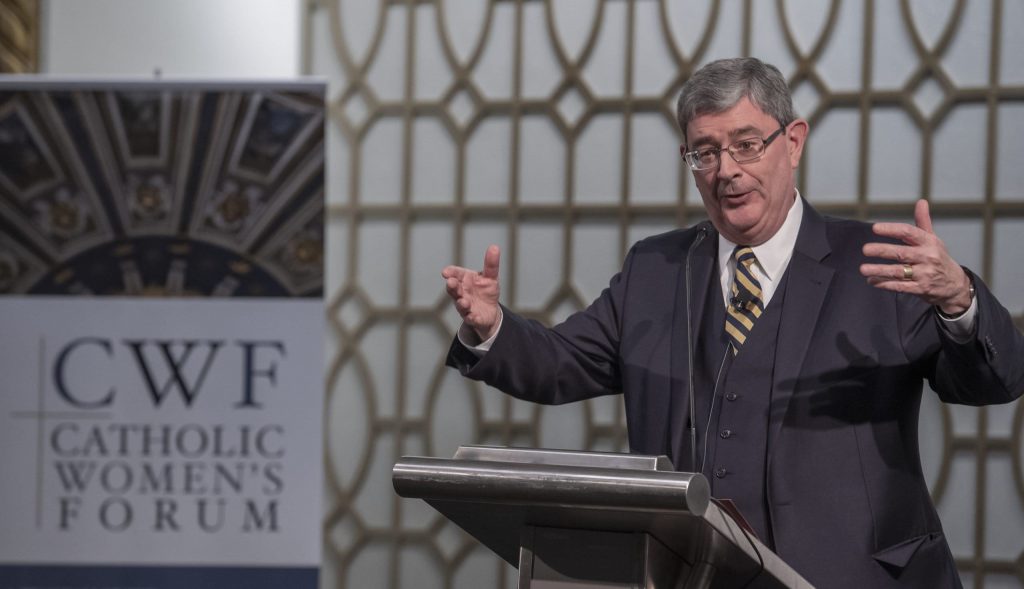
Published July 30, 2019
It’s the difference 30 years make. At the beginning of the last decade of the 20th century, the Soviet Union disintegrated. People living behind the Iron Curtain began to reclaim their God-given freedom. There was a widespread feeling of triumph and hope. Western democracies felt satisfaction that their efforts during the long Cold War had paid off and communism’s threat to a Christian way of life would never gain the upper hand. The Catholic Church had a pope whose steadfast teaching of Christian truths helped greatly in liberating the masses under Soviet hegemony.
That pope — St. John Paul II — shepherded the Church through a series of special years dedicated to the Father, Son, and Holy Spirit into the new millennium. He spoke of a hope that the bloody century then coming to a close would give way to a new springtime for the Church and society.
Now, a fifth of a century past the year 2000, the Church’s credibility has been badly rocked from a series of sexual abuse scandals, leading many to question Catholicism’s right to guide public morality and public policy. Gay marriage, once unthinkable, has become widely legal, if not broadly accepted, and it often seems that the prolife movement may never fully restore legal protection for all unborn babies.
The American public spends billions of dollars a year on pornography while houses of worship shutter due to declining membership and lack of money. Meanwhile, American political life and even the members of the Catholic Church are perhaps more divided than they have ever been.
What happened? Why has the great hope of 1989 yielded to the widespread misery and division found in so many societies around the world, particularly the most affluent?
The pope who presided over the fall of communism also warned that societies’ newfound freedom could be dangerous if those who enjoyed it didn’t understand it the right way.
As George Weigel wrote in The End and the Beginning (Doubleday, 2010), the second part of his magisterial biography of St. John Paul II, the pope taught that politics and economics built on an understanding of the “inalienable dignity and inestimable value of every human life … could lead to genuine human flourishing,” while those that ignored that truth “would create new shackles.”
Weigel attempts a further explanation of why things have so radically changed in a new book, The Fragility of Order: Catholic Reflections on Turbulent Times (Ignatius Press, 2018).
“Order, it has become clear, is a very fragile thing,” he writes in the introduction to the book, “and order is especially vulnerable under the cultural conditions of a postmodern world unsure about its grasp on the truth of anything.”
Born in Baltimore in 1951, Weigel serves as a distinguished senior fellow and the William E. Simon Chair in Catholic Studies at the Ethics & Public Policy Center, a Washington think tank. He is the author of Witness to Hope (HarperCollins, 1999), the first part of the St. John Paul II biography, as well as Tranquillitas Ordinis: The Present Failure and Future Promise of American Catholic Thought on War and Peace (Oxford University Press, 1987) and many other books and newspaper columns.
Weigel spoke with Catholic Digest about his latest book and offered some ideas on how average Christians can cope with the change — and perhaps even make a contribution to restoring order in society.
Q: Your book The Fragility of Order opens by reminding readers that the world has witnessed tremendous change in just a few decades. If I may summarize it in very simple terms, you write that some 30 years ago, it looked like the West had triumphed over communism and the United States was the undisputed leader of the free world. Today, China, Russia, and militant Islam pose major and serious threats to America, and moral relativism has infiltrated every level of society and religious life. What do you see as the main forces that brought about this radical change?
A: The West thought it could take a holiday from history after the Cold War, and that has led to considerable turbulence in world affairs. The long-term effects of the ’60s were not sufficiently measured by those who imagined that a triumphant free world would simply continue to develop harmoniously in its domestic politics and in social life. And Catholics paid insufficient attention to John Paul II’s teaching that a vibrant public moral culture is essential to democracy and the free economy working properly.
Q: Your book is subtitled Catholic Reflections on Turbulent Times. There certainly is a sense that we are living through turbulent times. But when did we not have turbulent times? What makes these days different?
A: Today’s domestic turbulence is rather more disconcerting because it’s expressing itself through radically incompatible views of the human person and human flourishing. Where is there “common ground” between proponents of the abortion license or euthanasia or transgenderism and those who believe that these practices are fundamental assaults on human dignity?
As for world politics, the lack of leadership from the United States and Europe has left the field open to authoritarians (and worse) in ways we haven’t seen since democratic fecklessness in the 1930s helped bring on World War II. And in the Church, Rome often seems to be a source of turbulence these days rather than a source of stability.
Q: I’m curious about how you view the 2016 election of Donald J. Trump as president of the United States. Might it be a watershed moment in our history? If so, why?
A: I hope it’s not a watershed, because if it were, that would indicate that vulgarization and “going low” were the future of our public life. I’m grateful for President Trump’s Supreme Court nominations, but his constant appeal to some very base instincts cannot be good for our civic life over the long haul. Of course, the same problem exists on the other side of the partisan divide, as the shameful behavior of the Senate Democrats during the Kavanaugh hearings amply demonstrated. This dumbing down of everything will only stop when people demand that it stops.
Q: As a society, what do you think are some of the steps we have to take to regain the order the world needs?
A: We have to rebuild family life, voluntary associations, and local communities. That’s where people learn to be democratic citizens, not hyper-partisan down-shouters. Over the long run, however, I think nothing short of a new Great Awakening, in which the country rediscovers those “self-evident” moral truths on which it was founded, is going to save the American experiment from descending into incoherence and then some form of authoritarianism. There are no guarantees about democracy. It takes a critical mass of people living certain virtues to make democracy work. We’re suffering from a serious virtue deficit at the moment, certainly at the level of national politics.
Q: While political and religious leaders and intellectuals strive to find the best answers to solving the world’s problems, what practical steps can an average Catholic family in America today take to help society regain sanity, at least in some small way?
A: Pray together. Teach children the truth, with both conviction and patience. Be of service to those who find the demands of life in a postindustrial economy and a postmodern culture of hedonism difficult. Demand civility from public officials. And don’t let the kids spend so much time online and on social media!
Q: What about the Benedict Option that some propose to preserve the faith?
A: I don’t really know what the Benedict Option is, as no one seems to be able to define it precisely. If it means a radical withdrawal from public life into enclaves of intentional Christian community, that’s impossible (where will you go?), irresponsible (there are serious public officials who deserve our support), and very un-Benedictine (Benedict’s monasteries were about the renewal of culture, not escaping from it).
I’ve written about a “Gregorian Option,” modeled on Pope St. Gregory the Great, a former Benedictine abbot who sent the man we now know as St. Augustine of Canterbury from that Roman monastery to convert what’s now England. That’s what we need — intentional Christian communities that are launch platforms for mission and evangelization.
 Q: Could you reflect a bit on how each of our three most recent popes — Francis, Benedict XVI, and St. John Paul II — have interacted with our troubled world? What lessons can we learn? What does the future hold?
Q: Could you reflect a bit on how each of our three most recent popes — Francis, Benedict XVI, and St. John Paul II — have interacted with our troubled world? What lessons can we learn? What does the future hold? A: John Paul II and Benedict XVI made acute analyses of postmodern society’s challenges, stressing the imperative of reclaiming the inalienable dignity of the human person, freedom understood as the freedom to choose the good as a matter of moral habit, and the crucial importance of a vital public moral culture to making freedom work politically and economically. Pope Francis has usefully reminded us that we shouldn’t turn the planet into a trash dump. All of those are important lessons for the 21st century.
Q: Speaking of St. John Paul II, you are well known as his biographer. Could you reflect on having that status, how it has affected you, and how it has changed your life?
A: The memoir I published in 2017, Lessons in Hope: My Unexpected Life with St. John Paul II (Basic Books) goes into that in some detail, so I think I’ll refer readers to that. He was an extraordinary man, and a day doesn’t pass without my thinking of him — and praying for his intercession, which both the Church and the world badly need.
George Weigel is Distinguished Senior Fellow of Washington, D.C.’s Ethics and Public Policy Center, where he holds the William E. Simon Chair in Catholic Studies.











